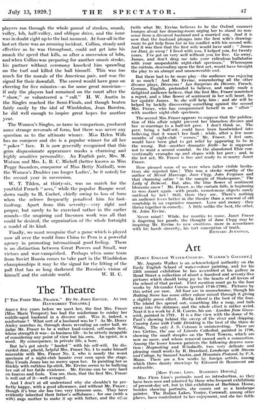The Theatre [" THE FIRST MRS. FRASER." By ST. JOHN
ERVINE. AT THE HAYMARKET THEATRE.] ABOUT five years before we meet her, the first Mrs. Fraser (Miss Marie Tempest) has had the misfortune to mislay her middle-aged husband in a divorce suit. Was it, indeed, a misfortune ? What sort of a husband was he ? As Mr. Henry Ainley marches in, through doors revealing an outer hall, we judge Mr. Fraser to be a rather loud-voiced, self-made Scot, whose strength it was--in business life—to be utterly incapable of considering any point of view but his own. An egoist. in a word. By consequence, in private life, a bore.
, But he's got nicely " landed with his self-will. He dis- carded dear, placid, helpful Mrs. Fraser No. 1 to make himself miserable with Mrs. Fraser No. 2, who is nearly the worst specimen of a night-club lunatic ever seen upon the stage. Miss Ursula Jeans has no mercy upon her. In painting her so thickly with ruthless lip-stick, Mr. Ervine seems to be bullying her out of her futile existence. Mr. Ervine can be very hard on knaves and fools. You see, then, that the first Mrs. Fraser is well out of it—well avenged.
And I don't at all understand why she shouldn't be per- fectly happy, with a good allowance, and without Mr. Fraser ; though it's true she has two very tiresome sons. They have evidently inherited their father's selfishness ; for one (with a wife) nags mother to make it up with father, and the otLes
(with what Mr. Ervine believes to be the Oxford manner) lounges about her drawing-room urging her to stand no non- sense from a divorced husband and a married son. And it is now that the husband plunges into the first wife's drawing- room to get help from her in his conflict with his second wife. And it was then that the first wife would have said : " James (or Jim), go away ! I lived with you, I helped you, for twenty years. I've got on very well without you for five. Go away, James, and don't drag me into your ridiculous hullabaloo with your unspeakable night-club specimen." Whereupon the curtain, descending upon the first act, would have brought the play to an abrupt and unanswerable end.
But there had to be more play—the audience was enjoying it so much ! And Mr. Ervine, remembering all the other divorce plays, Divorcnns ! Lea Surpriser du Divorce, French, German, English, pretended to believe, and easily made a delighted audience believe, that the first Mrs. Fraser nourished a regret, and a blue flower of sentiment in her soft heart, for her egoistic James. So she will help him ; and she will be helped by luckily discovering something against the second Mrs. Fraser, who has compromised herself in an " affair " with another night-club specimen.
The second Mrs. Fraser appears to suppose that the publica- tion of this affair might prevent her blameless divorce and her re-marriage to a half-wit peer. I don't think so. The peer, being a half-wit, could have been hoodwinked into believing that it wasn't her fault ; while, after a few more months of night-club " scenes," Mr. Fraser, I feel sure, would have been glad to get relief by appearing to be in the wrong. But—another dramatic ficelle—he is supposed not to want a second scandal. So the abandoned Elsie con- ventionally crumples up and elopes with her peer ; and, in the last act, Mr. Fraser is free and ready to re-marry Janet Fraser.
How pleased some of us were when (after visible hesita- tion) she rejected him ! This was a stroke worthy of the author of Mixed Marriage, Jane Clegg, John Ferguson and that charming satire " in the margin of Shakespeare," The Lady of Belni9nt. But, alas, the blue flower of sentiment blossoms anew ! Mr. Fraser, as the curtain falls, is beginning to woo Janet again--with pearls. monotonous objects surely outlived by her ! Still, there they are. There's nothing an audience loves better in the theatre than a renewal of old courtship in an expensive manner. Love and money—they thrive together in comedy. A little unlike the best, the other, St. John Ervine.
Never mind ! While, for months to come, Janet Fraser is fingering her pearls, the thought of Jane Clegg may be inspiring Mr. Ervine to new creations, more in accordance with his harsh sincerity, his tart conception of truth. RICHARD JENNINGS.
































 Previous page
Previous page